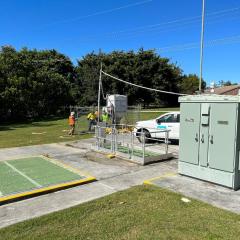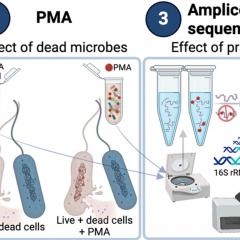Igor Vassilev, PhD student at UQ’s Advanced Water Management Centre, was awarded the ISMET Discovery Award for Best Scientific Paper 2018 for his paper ‘Microbial Electrosynthesis of Isobutyric, Butyric, Caproic Acids, and Corresponding Alcohols from Carbon Dioxide’ published in the peer-reviewed journal ACS Sustainable Chemistry & Engineering.
“I am very honoured to receive the ‘Discovery Award for Best Scientific Paper 2018’. Thank you ISMET!” said Igor.
“I am proud to be a member of such a great and supporting community. Special thanks goes also to my supervisors for their contributions, making the research paper outstanding.”
Igor’s publication demonstrates the great potential of microbial electrosynthesis.
“This technology allows us to supply microorganisms with electricity from renewable energy sources to empower the sustainable conversion of the greenhouse gas carbon dioxide (CO2) into valuable chemicals,” he said.
So far, the product spectrum has mostly been limited to acetate, and despite the environmental benefits of recycling CO2 emissions to counter global warming, bioelectrochemical production of acetate is not very attractive from an economic point of view.
“Research into product diversification toward chemicals with higher value than acetate is critical to make microbial electrosynthesis economical feasible,” said Igor.
Specific cultivation conditions in a bioelectrochemical reactor enabled the production of industrially relevant commodity chemicals and energy-rich biofuels.
This great contribution to the bio-electrochemistry community will support the development of a circular bio-economy.
“We should not look at CO2 as a harmful greenhouse gas, but as a potential substrate for sustainable production of useful chemicals,” said Igor.
“Microbial electrosynthesis has the power to make such a synthesis process possible.”
The International Society for Microbial Electrochemistry and Technology (ISMET) acknowledges outstanding work published by postgraduate students, postdoctoral researchers and industry affiliates who are current ISMET members.
The award acknowledges the best scientific publication in the bio-electrochemistry field for the year.
The goal of ISMET is to link researchers from various areas of science and engineering towards studying the complex interactions of microorganisms and electrodes, while finding novel ways to use them for sustainability applications.
You can find the paper online here https://pubs.acs.org/doi/abs/10.1021/acssuschemeng.8b00739.



